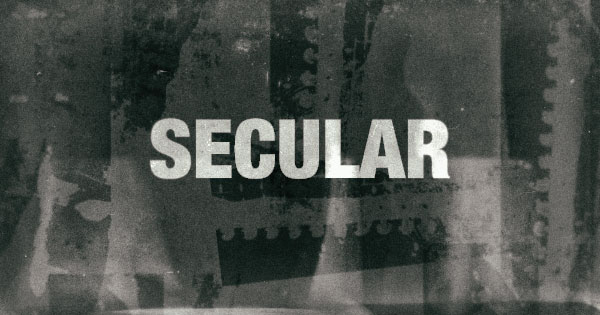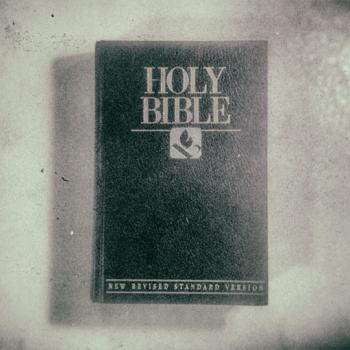This guest post was written by Allison Lynch.

Secular.
Along with catchphrases like “on fire for God” and “love the sinner, hate the sin,” it’s one of the most repeated words in Evangelical Christian doctrine. Although by definition it simply pertains to anything not affiliated with religion or spirituality, it’s been used in Evangelical circles to demonize anything outside of the realm of the church. For example, radio music is secular. The popular television series Game of Thrones is secular. The desire to advance your career and be successful is just a worldly, emptying pursuit, and only Jesus can give us meaning.
When a Christian tells me something or someone is “secular,” to me that’s merely a judgmental euphemism for “sinful.” And that’s why I’m here to argue that the dichotomy of a godly world versus a secular world is all bullshit.
First off, let me preface my story with the following statement: although I was raised in an Evangelical Christian home, I don’t believe in the Western Christian Jesus anymore. I do not know what he looks like (because he’s definitely not an angelic looking Aryan man if he was born a Middle Eastern Jew), or why he wants to live in my heart so I can go to Heaven. In fact, I don’t even know what it means to be a Christian anymore, because I’ve heard hundreds of interpretations from Christians who all supposedly follow the Bible the correct way. I’m not so sure about anything anymore, so has God crossed me off his “Nice” list?
God. That’s another mystery to me. I stopped viewing him as a person because I didn’t want to anthropomorphize the Creator of the Universe into something that mimics petty human thoughts and emotions. Biblical writers did this all the time, turning God into a booming voice in the sky who becomes so disappointed and angry at human beings that he summons a mass genocide to a world he created. And yet somehow he can’t manage to kill all the terrorists and abusers in the world today to make the world a better place.
Call me progressive, call me unbiblical, call me a heretic. I’ve heard it all before. I’m a secular human being now for “straying” from black and white Christian doctrine and for questioning everything I was taught to believe. As long as my mind works and I can think freely, I won’t stop questioning until the day I die.
My “walk” with Jesus (I put this in quotation marks because this is another trademark catchy Jesus saying) began when I was five years old and I accepted him into my heart in a church parking lot. I didn’t have a traumatic testimony story at that age that brought me to conversion, so most of my youth and adolescence were spent searching for sinful flaws in myself (and inevitably learning to dislike myself) in order to have a reason to believe in Jesus and feel “saved.” I lived in a Christian bubble where everything outside of church was secular and “bad,” and everyone I knew who wasn’t a Christian needed to be converted. Even if the message wasn’t explicit, it’s the message I picked up.
This is the divided reality of Evangelical Christianity. It’s you versus the world. The believers versus the non-believers. The spirit versus the flesh. Godly behavior versus worldly behavior. The world is evil and full of sin, and as a Christian, it’s your duty to repent and accept Christ so you can go to Heaven, and to proselytize to others so they can do the same. You are a victim who must defend your faith. Without Jesus, you are nothing. You can do nothing. Your confidence is brazened, and any self-assertion or deviation from biblical standards is seen as personal, ungodly pride. Only by going to church, tithing, studying Scripture, and staying close to your church community can you start to understand the message of Jesus.
Again, I call bullshit.
My deconversion has been a steady, although difficult process. I wouldn’t really call it deconversion—I guess I would just call it becoming myself, and letting go of religion. There are days I wake up and feel as though maybe I am too deep into the secular world to know what’s good for me anymore, as if I’ve lost my morals and can’t differentiate right from wrong. I’m lost in a sea of secular selfishness. Maybe I’ve listened to Kendrick Lamar’s To Pimp A Butterfly album too much. Maybe I’ve gone to too many bars with friends. Maybe I just want to enjoy living in the moment for once, instead of worrying about how every action on earth affects my eternal standing.
As a child, I was terrified of demons. They were talked about often at church and in my family. The more worldly you become, the more susceptible you are to demonic influence. Drugs, partying, premarital sex, divorce, abortion—all these things happen to people who want to curse God and live life on their own terms.
I had read 23 Minutes in Hell by Bill Wiese several times. I was not allowed to watch scary movies, so this was the next best thing. Actually, it was worse. In the story, Weise talks about his overnight journey to Hell where he was tortured by demons and experienced the most excruciating sorrow and loneliness ever imaginable. That was enough to convince me that Hell was real, and that I was not going there under any circumstances. Pastors like Mark Driscoll also helped convince me that even most Christians won’t get into Heaven. After all, it’s harder for a rich man to get into Heaven than for a camel to go through the eye of a needle.
In other words, it’s impossible.
“Oh, well don’t take the Bible so literally.”
Oh don’t worry, I don’t.
Later in life when I graduated from Gordon College, a private Christian school in Massachusetts, I was “on fire” again for God and ready to reclaim my life as a real Christian. I was merely “lukewarm” in college, and it was time to take Jesus seriously since he died for me and I owed him. I broke up with my fiancé, got baptized again (just in case), started going to a new church, and abstained from the non-Christian behavior the regular people of the world were so into. Life felt fresh, my soul felt cleansed, and I finally felt like I was on the right path again. God and I were good. This is what “being born again” is all about.
This lasted for about three months. The sparkle of a new church with new people who were so ready to welcome me quickly faded. There were things I had to hide from my small group in order to feel accepted. There were things I blatantly disagreed with that my pastor said and did. I found myself wanting to spend time with non-church people during the week, and to spend my Sundays enjoying a long run and brunch with my running club instead of going to church. I was training for my first marathon, and I was also very interested in a guy in the club who was a non-practicing Catholic. I felt guilty about it.
Pretty soon, I stopped going to church altogether. I had met some wonderful people there, but everything was punctuated with church language, and there was definitely a close-knit community within the church that seemed to be the “in” group—they led worship, hosted church gatherings, held the communion bread, and were very active on social media tagging each other in various things and posting Bible verses. It was annoying.
I found comfort in spending time alone and doing my own thing. Eventually, I moved to Boston and started working for a start-up doing account management for a content development company. This was my first full-time, salaried job, and my first taste of what it was like to be a single, agnostic Millennial living and working in the city. I finally felt like I was independent, and no longer embarrassed of my previously sheltered identity. Although, I still had to say I went to “that Christian college that doesn’t hire gay people,” but that’s another story for another day.
Life was good. It was hard sometimes, and I made a lot of mistakes (and I still do), but I finally felt connected to the world around me. I was so relieved to know that I didn’t have to work as a missionary, or be writer for Lifeway. I didn’t have to marry a youth pastor, and I didn’t have to go to Bible study anymore. The people who I connected with most—the artists, the start-up innovators, the vegan juice bar cashier—none of them were Christians, and all of them made me happy.
When you venture away from Evangelicalism and discover your own path in life, you start to change. You recognize that you are responsible for your happiness and your choices, and that these things are not dependent on your standing with God. You start to see people for who they really are—not whether or not they’re saved. And then you respect who they are, and you don’t try to change them (unless of course they ask for your help).
I reject the idea that you can only find God in an Evangelical Christian church setting, or that you can only begin to understand God through the message of Jesus Christ. There are so many gaping holes in this theology, it’s hard to know where to begin. I remember being told in a sermon once that you can’t know God just by hanging out in a forest by yourself, contemplating the meaning of life. The pastor poked fun at this hippie kind of lifestyle, mimicking the Buddhist “om” sound while he put his hands together. At the time I was very anti-Eastern religions, but now I enjoy things like yoga and Buddhist wisdom. Maybe, just maybe, the whole message of Jesus Christ was to eliminate the man-made theological barriers that enslave people to the idea that there’s only one very particular way to know God, so that they could become the freely thinking, unique individuals God actually created them to be. I hope so.
I still talk to Jesus and to God regularly. It’s just how my mind thinks, since I was raised on the mantra of Colossians 3:17: “And whatever you do, whether in word or deed, do it all in the name of the Lord Jesus, giving thanks to God the Father through him.”
Jesus, if you’re listening, I’m becoming more secular in your name.
 About Allison Lynch
About Allison Lynch
Allison Lynch is a twenty-something who lives and works in Boston as a marketing communications professional in the health & fitness industry. When she’s not writing, she’s either training for her next competitive running event, or volunteering at the House Rabbit Network, a shelter for abandoned, domestic rabbits. Her goal in life is to use writing and art as ways to connect with others, and to help women feel empowered through the strength and beauty of their unique bodies.
Author photo by Shef Reynolds / Article photo by Dan Wilkinson
















